BRETXIT_英国脱欧
【南通环球教育(原环球雅思)】Brexit-由英国脱欧说起-张蓓蓓
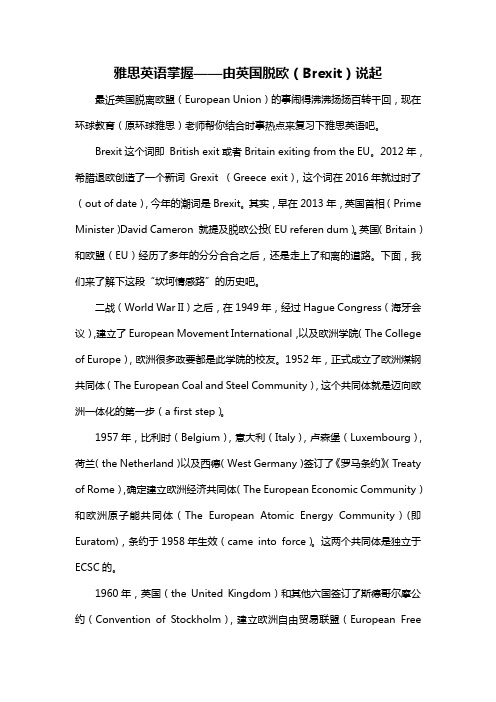
雅思英语掌握——由英国脱欧(Brexit)说起最近英国脱离欧盟(European Union)的事闹得沸沸扬扬百转千回,现在环球教育(原环球雅思)老师帮你结合时事热点来复习下雅思英语吧。
Brexit这个词即British exit或者Britain exiting from the EU。
2012年,希腊退欧创造了一个新词Grexit (Greece exit),这个词在2016年就过时了(out of date),今年的潮词是Brexit。
其实,早在2013年,英国首相(Prime Minister)David Cameron 就提及脱欧公投(EU referen dum)。
英国(Britain)和欧盟(EU)经历了多年的分分合合之后,还是走上了和离的道路。
下面,我们来了解下这段“坎坷情感路”的历史吧。
二战(World War II)之后,在1949年,经过Hague Congress(海牙会议),建立了European Movement International,以及欧洲学院(The College of Europe),欧洲很多政要都是此学院的校友。
1952年,正式成立了欧洲煤钢共同体(The European Coal and Steel Community),这个共同体就是迈向欧洲一体化的第一步(a first step)。
1957年,比利时(Belgium),意大利(Italy),卢森堡(Luxembourg),荷兰(the Netherland)以及西德(West Germany)签订了《罗马条约》(Treaty of Rome),确定建立欧洲经济共同体(The European Economic Community)和欧洲原子能共同体(The European Atomic Energy Community)(即Euratom),条约于1958年生效(came into force)。
英国退出欧盟英文作文
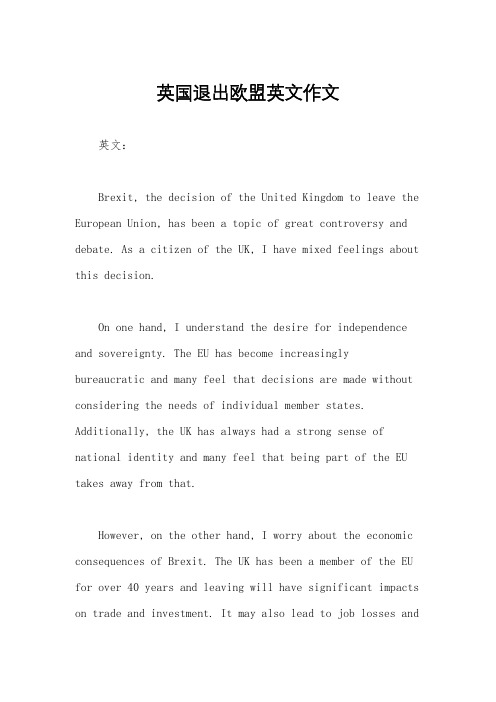
英国退出欧盟英文作文英文:Brexit, the decision of the United Kingdom to leave the European Union, has been a topic of great controversy and debate. As a citizen of the UK, I have mixed feelings about this decision.On one hand, I understand the desire for independence and sovereignty. The EU has become increasingly bureaucratic and many feel that decisions are made without considering the needs of individual member states. Additionally, the UK has always had a strong sense of national identity and many feel that being part of the EU takes away from that.However, on the other hand, I worry about the economic consequences of Brexit. The UK has been a member of the EU for over 40 years and leaving will have significant impacts on trade and investment. It may also lead to job losses andeconomic instability.Overall, I think that Brexit is a complex issue with both positives and negatives. It is important for the UK to maintain strong relationships with our European neighbors and work towards a mutually beneficial solution.中文:英国脱欧,即英国决定退出欧盟,一直是一个备受争议和辩论的话题。
高考时事英语热点外刊回顾英国脱欧之路Brexitppt
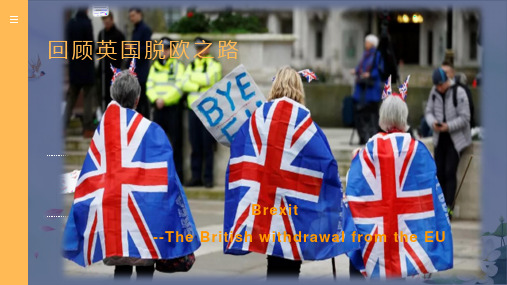
★ times of trouble困难时期 ★ agree with与……一致 ★ keep ... out of ...将……排除在……之外
高考时事英语热点外刊回顾英国脱欧 之路Bre xitppt
许多人在庆祝英国退欧。然而,很少有人记得英国当初加入欧盟是多么困难。 第二次世界大战后,英国的世界性帝国濒临灭亡。它的经济正在衰退。
★ celebrate庆祝 ★ Brexi英国退欧 ★ World War II第二次世界大战 ★ empire 帝国
高考时事英语热点外刊回顾英国脱欧 之路Bre xitppt
It is all likely to be difficult. 这一切可能都很困难。
★ follow the EU's rules 继续遵守欧盟的规则
★ agreements 协议
★ trade贸易
★ security 安全
高考时事英语热点外刊回顾英国脱欧 之路Bre xitppt
★ likely 可能的
People there voted by a large majority to stay in the union. 绝大多数伦敦人投票赞成留在欧盟。
★ citizen公民
★ a large majority 绝大多数
高考时事英语热点外刊回顾英国脱欧 之路Bre xitppt
★ union 联盟
“我们将继续欢迎来自世界各地的人们,无论他们的肤色、护照的颜色或国旗的颜色 是什么,”他补充说。
★ continue继续 ★ the color of their skin肤色 ★ passport护照 ★ national flag国旗 ★ add补充
口译关于脱欧的对话

口译关于脱欧的对话1. 引言脱欧(Brexit)是指英国脱离欧洲联盟(EU)的决定。
自2016年英国公投以来,脱欧一直是全球关注的焦点之一。
本文将通过一场口译对话,探讨与脱欧相关的重要议题和影响。
2. 对话开始主持人(M):欢迎各位观众,今天我们邀请了两位嘉宾来讨论有关脱欧的问题。
请允许我介绍左侧是支持留在欧盟的代表,右侧是支持脱离欧盟的代表。
支持留在欧盟代表(L):大家好!支持脱离欧盟代表(R):你好!M:让我们首先从讨论英国为什么要进行脱欧这个议题开始。
L,请您发表您的观点。
L:首先,我认为参与EU有助于加强英国在全球舞台上的影响力。
EU提供了一个经济、政治和安全合作的平台,使得成员国能够共同应对全球挑战。
此外,EU的单一市场为英国企业提供了更大的贸易机会和经济增长潜力。
R:感谢L的发言。
然而,我认为脱欧是保护英国主权和控制自身事务的必要举措。
EU的决策过程缺乏透明度和民主性,让英国无法自主决定自己的法律和移民政策。
脱欧将使英国能够恢复对自身事务的掌控,并建立更加灵活的贸易关系。
M:谢谢你们两位的观点。
接下来,我们将讨论脱欧对英国经济和就业市场的影响。
R,请您开始。
R:脱欧可能会带来短期不确定性,但我相信这是一个值得承受的代价。
脱离EU 后,英国可以自由地与全球其他国家进行贸易协议,拓展新兴市场。
此外,摆脱EU规定的繁文缛节,减少监管成本对企业发展也是有利的。
L:我理解R所提到的机会,但我认为脱欧对于英国经济来说仍然是一个风险。
英国与EU之间的贸易是相互依存的,脱欧可能导致关税壁垒和贸易摩擦。
此外,脱欧可能对金融服务业造成冲击,这是英国经济的重要支柱。
M:非常有见地。
下面我们将讨论脱欧对于英国与欧盟其他成员国的关系带来的影响。
L,请您发表您的观点。
L:脱欧将导致英国与欧盟其他成员国之间的分离,这可能会对安全合作、科研合作和人员流动产生负面影响。
此外,英国退出EU后,需要与EU重新谈判贸易协议,这可能是一项复杂且漫长的过程。
英国“脱欧”法案及其进程
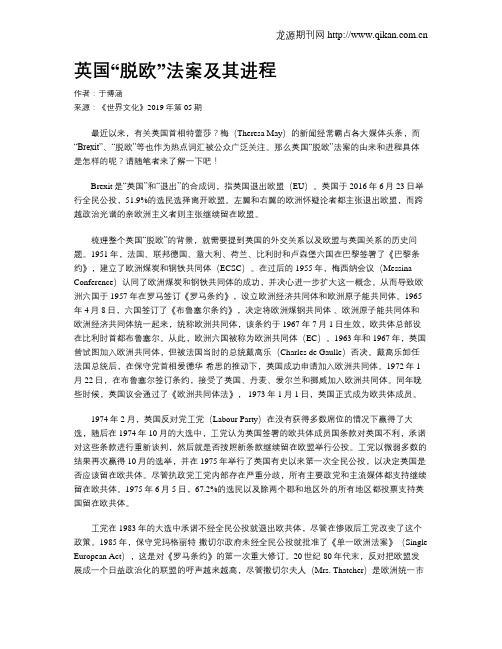
英国“脱欧”法案及其进程作者:于博涵来源:《世界文化》2019年第05期最近以来,有关英国首相特蕾莎?梅(Theresa May)的新闻经常霸占各大媒体头条,而“Brexit”、“脱欧”等也作为热点词汇被公众广泛关注。
那么英国“脱欧”法案的由来和进程具体是怎样的呢?请随笔者来了解一下吧!Brexit是“英国”和“退出”的合成词,指英国退出欧盟(EU)。
英国于2016年6月23日举行全民公投,51.9%的选民选择离开欧盟。
左翼和右翼的欧洲怀疑论者都主张退出欧盟,而跨越政治光谱的亲欧洲主义者则主张继续留在欧盟。
梳理整个英国“脱欧”的背景,就需要提到英国的外交关系以及欧盟与英国关系的历史问题。
1951年,法国、联邦德国、意大利、荷兰、比利时和卢森堡六国在巴黎签署了《巴黎条约》,建立了欧洲煤炭和钢铁共同体(ECSC)。
在过后的1955年,梅西纳会议(Messina Conference)认同了欧洲煤炭和钢铁共同体的成功,并决心进一步扩大这一概念。
从而导致欧洲六国于1957年在罗马签订《罗马条约》,设立欧洲经济共同体和欧洲原子能共同体。
1965年4月8日,六国签订了《布鲁塞尔条约》,决定将欧洲煤钢共同体、欧洲原子能共同体和欧洲经济共同体统一起来,统称欧洲共同体,该条约于1967年7月1日生效,欧共体总部设在比利时首都布鲁塞尔。
从此,欧洲六国被称为欧洲共同体(EC)。
1963年和1967年,英国曾试图加入欧洲共同体,但被法国当时的总统戴高乐(Charles de Gaulle)否决。
戴高乐卸任法国总统后,在保守党首相爱德华·希思的推动下,英国成功申请加入欧洲共同体。
1972年1月22日,在布鲁塞尔签订条约,接受了英国、丹麦、爱尔兰和挪威加入欧洲共同体。
同年晚些时候,英国议会通过了《欧洲共同体法》, 1973年1月1日,英国正式成为欧共体成员。
1974年2月,英国反对党工党(Labour Party)在没有获得多数席位的情况下赢得了大选,随后在1974年10月的大选中,工党认为英国签署的欧共体成员国条款对英国不利,承诺对这些条款进行重新谈判,然后就是否按照新条款继续留在欧盟举行公投。
2017年MBA备考话题
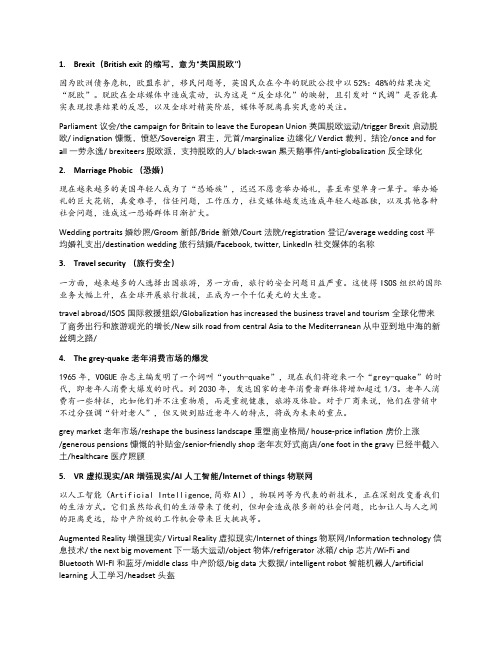
1.Brexit(British exit的缩写,意为“英国脱欧”)因为欧洲债务危机,欧盟东扩,移民问题等,英国民众在今年的脱欧公投中以52%:48%的结果决定“脱欧”。
脱欧在全球媒体中造成震动,认为这是“反全球化”的映射,且引发对“民调”是否能真实表现投票结果的反思,以及全球对精英阶层,媒体等脱离真实民意的关注。
Parliament议会/the campaign for Britain to leave the European Union英国脱欧运动/trigger Brexit启动脱欧/ indignation慷慨,愤怒/Sovereign君主,元首/marginalize边缘化/ Verdict裁判,结论/once and for all一劳永逸/ brexiteers 脱欧派,支持脱欧的人/ black-swan 黑天鹅事件/anti-globalization反全球化2.Marriage Phobic (恐婚)现在越来越多的美国年轻人成为了“恐婚族”,迟迟不愿意举办婚礼,甚至希望单身一辈子。
举办婚礼的巨大花销,真爱难寻,信任问题,工作压力,社交媒体越发达造成年轻人越孤独,以及其他各种社会问题,造成这一恐婚群体日渐扩大。
Wedding portraits 婚纱照/Groom新郎/Bride新娘/Court法院/registration登记/average wedding cost平均婚礼支出/destination wedding旅行结婚/Facebook, twitter, LinkedIn社交媒体的名称3.Travel security (旅行安全)一方面,越来越多的人选择出国旅游,另一方面,旅行的安全问题日益严重。
这使得ISOS组织的国际业务大幅上升,在全球开展旅行救援,正成为一个千亿美元的大生意。
travel abroad/ISOS国际救援组织/Globalization has increased the business travel and tourism全球化带来了商务出行和旅游观光的增长/New silk road from central Asia to the Mediterranean 从中亚到地中海的新丝绸之路/4.The grey-quake老年消费市场的爆发1965年,VOGUE杂志主编发明了一个词叫“youth-quake”,现在我们将迎来一个“grey-quake”的时代,即老年人消费大爆发的时代。
关于“英国退欧”(Brexit),你需要知道的一切
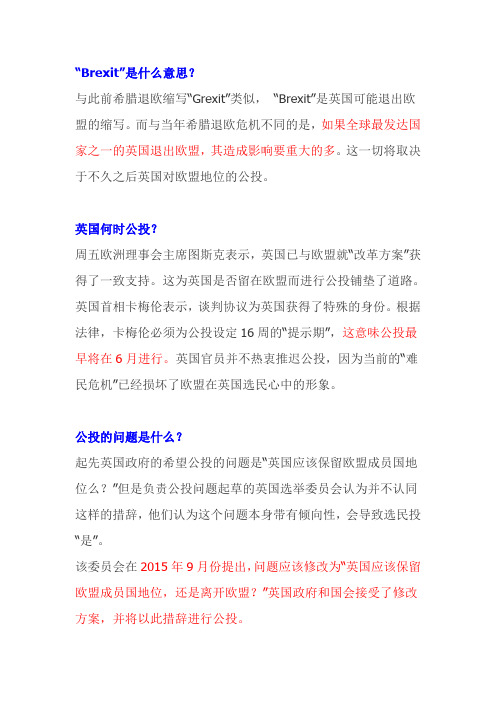
“Brexit”是什么意思?与此前希腊退欧缩写“Grexit”类似,“Brexit”是英国可能退出欧盟的缩写。
而与当年希腊退欧危机不同的是,如果全球最发达国家之一的英国退出欧盟,其造成影响要重大的多。
这一切将取决于不久之后英国对欧盟地位的公投。
英国何时公投?周五欧洲理事会主席图斯克表示,英国已与欧盟就“改革方案”获得了一致支持。
这为英国是否留在欧盟而进行公投铺垫了道路。
英国首相卡梅伦表示,谈判协议为英国获得了特殊的身份。
根据法律,卡梅伦必须为公投设定16周的“提示期”,这意味公投最早将在6月进行。
英国官员并不热衷推迟公投,因为当前的“难民危机”已经损坏了欧盟在英国选民心中的形象。
公投的问题是什么?起先英国政府的希望公投的问题是“英国应该保留欧盟成员国地位么?”但是负责公投问题起草的英国选举委员会认为并不认同这样的措辞,他们认为这个问题本身带有倾向性,会导致选民投“是”。
该委员会在2015年9月份提出,问题应该修改为“英国应该保留欧盟成员国地位,还是离开欧盟?”英国政府和国会接受了修改方案,并将以此措辞进行公投。
为什么要进行公投?英国的“公投之路”是曲折而漫长的。
2006年当时的作为反对党领袖的卡梅伦立下誓言,如果当选将就欧盟里斯本公约举行公投,而当时的工党没有进行公投就批准了该公约。
2010年卡梅伦当选首相之后,受到了两方面的公投压力:同盟英国独立党,以及保守党内部持“欧洲怀疑论”立场官员的压力。
最终在2013年,卡梅伦承诺如果保守党赢得2015年选举,英国将就“去/留”欧盟进行公投。
直到2015年英国大选前夜,卡梅伦本人也没有想到保守党能够大获全胜,事实上几乎也没有人这么认为。
但是最终保守党赢得了国会绝对多数,公投就不可避免的要进行了。
一些“Brexit”支持者认为公投有更深层的原因:许多英国公民对欧盟成员国地位不满,他们认为与英国1973年刚刚加入时相比,现在的欧盟已经变得面目全非。
欧盟是什么?欧盟有28个成员国组成,与其说类似国家的组织,它更像一个自由贸易区。
新概念词汇:Brexit是什么意思
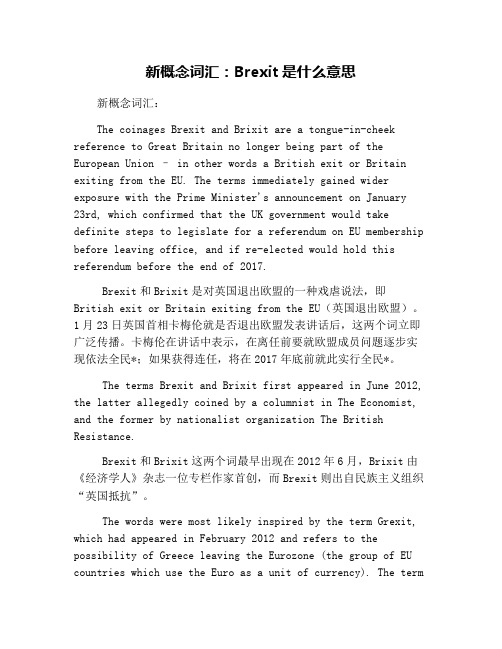
新概念词汇:Brexit是什么意思新概念词汇:The coinages Brexit and Brixit are a tongue-in-cheek reference to Great Britain no longer being part of the European Union – in other words a British exit or Britain exiting from the EU. The terms immediately gained wider exposure with the Prime Minister's announcement on January23rd, which confirmed that the UK government would take definite steps to legislate for a referendum on EU membership before leaving office, and if re-elected would hold this referendum before the end of 2017.Brexit和Brixit是对英国退出欧盟的一种戏虐说法,即British exit or Britain exiting from the EU(英国退出欧盟)。
1月23日英国首相卡梅伦就是否退出欧盟发表讲话后,这两个词立即广泛传播。
卡梅伦在讲话中表示,在离任前要就欧盟成员问题逐步实现依法全民*;如果获得连任,将在2017年底前就此实行全民*。
The terms Brexit and Brixit first appeared in June 2012, the latter allegedly coined by a columnist in The Economist, and the former by nationalist organization The British Resistance.Brexit和Brixit这两个词最早出现在2012年6月,Brixit由《经济学人》杂志一位专栏作家首创,而Brexit则出自民族主义组织“英国抵抗”。
英国脱欧是什么意思

英国脱欧是什么意思脱欧公投,指就英国是否脱离欧盟进行的公投。
下面是店铺为大家整理的关于:英国脱欧是什么意思。
欢迎阅读!英国脱欧是什么意思“英国脱欧”由“英国”(Britain)和“退出”(Exit)两个单词组合而成,是对英国退出欧盟的简称。
在 6 月 23 日的公投中,英国人需要就“英国应该继续保持欧盟成员地位,还是应该脱离欧盟”这一问题进行投票。
支持脱欧的人认为,英国必须离开欧盟,以保护甚至恢复这个国家的身份,包括文化、独立性以及世界地位。
这种说法常常与反对移民联系在一起。
支持留欧的人则普遍认为,留在欧盟中对英国经济更有好处。
而且,同留欧带来的移民问题和其他问题相比,脱欧带来的经济问题要更加严重。
英国脱欧最新结果公布6月24日,英国脱欧公投结果落定。
据BBC计票统计,支持脱欧的人数已过半,脱欧支持率为51.8%,留欧支持率为48.2%,英国成功实现脱欧。
英镑汇率遭遇重挫,跌破1英镑兑1.35美元,为1985年来的最低水平,而黄金大涨。
英国为什么脱欧由于历史与地理原因,自19世纪晚期以来,英国一直奉行着对于欧洲大陆事务不干预的政策,被称为“光荣的孤立”。
英国并非欧元区国家,虽然可以发行自己独立的货币,对其保持出口竞争力有利,也可以拥有自主的财政政策。
但是,这也使得英国却很难真正的加入欧洲大陆的事务处理。
尤其是今年欧债危机的关键时期,由于各种利益分歧明显,这一传统强国正在逐步丧失其在欧盟中的地位与参与权。
英国对欧盟的猜忌和不信任一直存在,英国保守党内部也有欧洲怀疑派。
不仅如此,他们还认为欧盟内部的政策对于欧盟有负面作用,未来一些政策趋势也可能损害到英国的利益。
而欧债危机的蔓延,不仅使英国的疑欧之心快速发酵,也加快了脱欧脚步。
与英国民众日益浓厚的疑欧、退欧情绪相对应,欧盟其他国家民众对英国的“不可靠”也日渐不满,认为英国作为欧盟的一员,在融入欧盟的过程中却表现消极,一直扮演着拖后腿的角色:它不仅否决欧元,不参加欧盟的危机救助方案,不为缓解危机出力,还反对一切金融监管政策,因此英国“出局”对欧盟的发展来说反而是好事,其他成员国在整合过程中受到的阻力会更小。
英国脱欧是什么意思

英国脱欧是什么意思脱欧公投,指就英国是否脱离欧盟进行的公投。
下面是为大家整理的关于:英国脱欧是什么意思。
欢迎阅读!英国脱欧是什么意思“英国脱欧”由“英国”(Britain)和“退出”(Exit)两个单词组合而成,是对英国退出欧盟的简称。
在6 月23 日的公投中,英国人需要就“英国应该继续保持欧盟成员地位,还是应该脱离欧盟”这一问题进行投票。
支持脱欧的人认为,英国必须离开欧盟,以保护甚至恢复这个国家的身份,包括文化、独立性以及世界地位。
这种说法常常与反对移民联系在一起。
支持留欧的人则普遍认为,留在欧盟中对英国经济更有好处。
而且,同留欧带来的移民问题和其他问题相比,脱欧带来的经济问题要更加严重。
英国脱欧最新结果公布6月24日,英国脱欧公投结果落定。
据BBC计票统计,支持脱欧的人数已过半,脱欧支持率为51.8%,留欧支持率为48.2%,英国成功实现脱欧。
英镑汇率遭遇重挫,跌破1英镑兑1.35美元,为1985年来的最低水平,而黄金大涨。
英国为什么脱欧由于历史与地理原因,自19世纪晚期以来,英国一直奉行着对于欧洲大陆事务不干预的政策,被称为“光荣的孤立”。
英国并非欧元区国家,虽然可以发行自己独立的货币,对其保持出口竞争力有利,也可以拥有自主的财政政策。
但是,这也使得英国却很难真正的加入欧洲大陆的事务处理。
尤其是今年欧债危机的关键时期,由于各种利益分歧明显,这一传统强国正在逐步丧失其在欧盟中的地位与参与权。
英国对欧盟的猜忌和不信任一直存在,英国保守党内部也有欧洲怀疑派。
不仅如此,他们还认为欧盟内部的政策对于欧盟有负面作用,未来一些政策趋势也可能损害到英国的利益。
而欧债危机的蔓延,不仅使英国的疑欧之心快速发酵,也加快了脱欧脚步。
与英国民众日益浓厚的疑欧、退欧情绪相对应,欧盟其他国家民众对英国的“不可靠”也日渐不满,认为英国作为欧盟的一员,在融入欧盟的过程中却表现消极,一直扮演着拖后腿的角色:它不仅否决欧元,不参加欧盟的危机救助方案,不为缓解危机出力,还反对一切金融监管政策,因此英国“出局”对欧盟的发展来说反而是好事,其他成员国在整合过程中受到的阻力会更小。
英国脱欧是什么意思啊

英国脱欧是什么意思啊英国脱欧(英文:Brexit)指的是英国脱离欧洲联盟(European Union,简称EU)的过程和结果。
这一事件是近年来国际政治经济领域中备受关注的热门话题之一,对英国、欧洲乃至全球产生了深远影响。
脱欧的背景英国加入欧盟的历史可以追溯到1973年。
然而,自欧洲一体化进程加速以来,英国与欧盟之间一直存在诸多矛盾和分歧。
一方面,英国政府和部分英国民众对欧洲一体化持怀疑态度,担心自主权受损和移民增加带来负面影响;另一方面,欧盟的部分政策和规定在英国引发了争议,使得不少英国民众对欧盟持批评态度。
在2016年6月23日举行的英国脱欧公投中,51.9%的选民选择支持离开欧盟,48.1%的选民选择留在欧盟。
这一结果意味着英国开始了正式脱欧的进程。
脱欧的意义国家主权英国脱欧被许多支持者视为恢复国家主权的体现。
英国脱离欧盟后,将不再受制于欧盟的法律和政策,重新获得国家自主权。
支持者认为,这将使得英国能够更加自主地制定适合自身国家利益的政策和法规。
移民政策移民政策是支持脱欧的一个重要因素。
英国脱欧意味着该国将能够控制自身的移民政策,减少或限制移民进入的数量和条件。
这一举措旨在降低移民对英国社会、经济和公共服务所带来的压力。
贸易和经济英国脱欧对贸易和经济领域产生了深远影响。
脱欧之后,英国将不再受制于欧盟的贸易政策和规定,有更大的自由去与其他国家和地区达成独立贸易协定。
然而,脱欧也带来了一定程度的不确定性,对英国与欧盟之间的贸易关系和经济合作造成了冲击。
欧洲一体化英国脱欧被认为是欧洲一体化进程中的一个重要转折点。
脱欧事件引发了欧盟内部的一系列变革和讨论,对欧洲一体化进程带来一定影响。
此外,英国脱欧还可能影响其他国家和地区对欧盟的看法和态度,鼓舞了一些国家和地区提出类似退欧的要求或加强对欧盟与自身关系的审视。
脱欧后的进程和影响英国脱欧的进程相当复杂,涉及到双方的协商和约定。
在2019年1月,英国正式启动了脱欧进程,开始与欧盟展开谈判。
英国脱欧是什么意思

英国脱欧是什么意思英国脱欧,就是英国脱离欧洲联盟。
脱,就是脱离的意思,即离开,断绝。
这里的"欧",指的是欧洲联盟,简称欧盟(EU),总部设在比利时首都布鲁塞尔(Brussel),是由欧洲共同体发展而来的。
英国脱欧,指英国脱离欧洲联盟计划。
2013年1月23日,英国前首相卡梅伦首次提及脱欧公投。
2016年6月,英国全民公投决定“脱欧”。
2017年3月16日,英国女王伊丽莎白二世批准“脱欧”法案,授权特雷莎·梅正式启动脱欧程序。
3月29日,“脱欧”程序正式启动。
根据英国与欧盟的协议,英国应在2019年3月29日正式“脱欧”。
2018年6月26日,英女王批准英国脱欧法案,允许英国退出欧盟。
7月12日,英国已经发布脱欧白皮书。
11月25日,欧盟除英国外的27国领导人一致通过了英国“脱欧”协议草案。
12月10日,欧洲法院裁定,英国可单方面撤销“脱欧”决定。
2019年3月12日,英国议会就修改后的“脱欧”协议进行了再次投票表决,但该协议仍然没有通过。
4月10日,欧盟各国达成一致,同意将“脱欧”日期延迟至10月31日。
4月12日,英国前独立党党魁法拉奇宣布成立脱欧党。
10月17日,欧盟委员会主席容克与英国首相约翰逊宣布欧盟与英国达成新的脱欧协议。
10月19日,英国议会要求首相寻求再度推迟“脱欧”。
10月22日,英国将暂停“脱欧”协议法案后续的审议、三读等立法程序,直到欧盟对英国延期“脱欧”的申请给出回复。
2019年10月22日,英国议会下院投票否决了首相约翰逊为推动“脱欧”协议尽快在英国议会通过而制定的立法时间表。
2020年1月,英国国会投票通过脱欧协议,欧洲议会将于1月29日对脱欧协议进行最后的审议和表决。
1月30日,欧盟正式批准了英国脱欧。
当地时间2020年12月31日,《英欧贸易与合作协议》正式生效,英国正式离开欧盟单一市场和关税同盟,彻底脱欧。
【影响】短期利益英国退出欧盟,在短期内对英国无疑是有利的。
脱欧名词解释

脱欧名词解释?
答:脱欧是一个网络流行词,指英国脱离欧洲联盟计划。
英国在2016年就举行了公投,结果是英国公民投票决定“脱欧”。
2020年1月30日,欧盟正式批准了英国脱欧,英国脱欧成为现实。
脱欧的含义是英国将不再受欧盟的法律法规和政策的约束。
脱欧的过程中,英国将重新建立与欧盟的关系,并确定未来的双边关系。
脱欧的最终结果将会影响英国和欧盟之间的经济、政治和社会关系。
以上是关于脱欧的信息,希望对您有所帮助。
另外,“脱欧”一词在日常生活中也有使用,表示在聚会的时候和大家讲自己要走了,但是过了很长时间还是继续的呆在那里,并没有离开。
浅析英国脱欧的主要原因
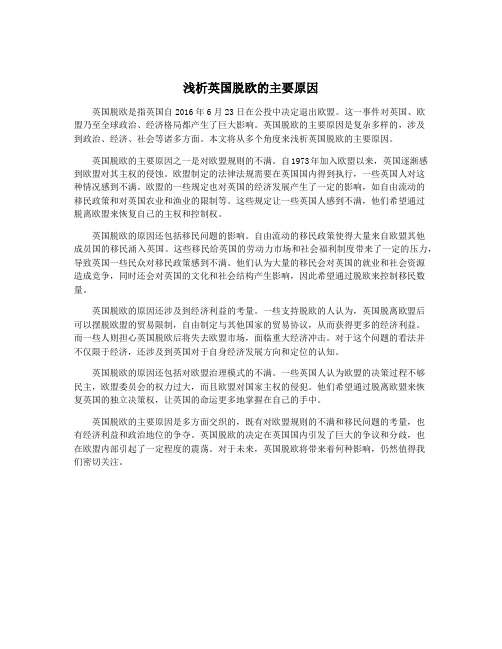
浅析英国脱欧的主要原因英国脱欧是指英国自2016年6月23日在公投中决定退出欧盟。
这一事件对英国、欧盟乃至全球政治、经济格局都产生了巨大影响。
英国脱欧的主要原因是复杂多样的,涉及到政治、经济、社会等诸多方面。
本文将从多个角度来浅析英国脱欧的主要原因。
英国脱欧的主要原因之一是对欧盟规则的不满。
自1973年加入欧盟以来,英国逐渐感到欧盟对其主权的侵蚀。
欧盟制定的法律法规需要在英国国内得到执行,一些英国人对这种情况感到不满。
欧盟的一些规定也对英国的经济发展产生了一定的影响,如自由流动的移民政策和对英国农业和渔业的限制等。
这些规定让一些英国人感到不满,他们希望通过脱离欧盟来恢复自己的主权和控制权。
英国脱欧的原因还包括移民问题的影响。
自由流动的移民政策使得大量来自欧盟其他成员国的移民涌入英国。
这些移民给英国的劳动力市场和社会福利制度带来了一定的压力,导致英国一些民众对移民政策感到不满。
他们认为大量的移民会对英国的就业和社会资源造成竞争,同时还会对英国的文化和社会结构产生影响,因此希望通过脱欧来控制移民数量。
英国脱欧的原因还涉及到经济利益的考量。
一些支持脱欧的人认为,英国脱离欧盟后可以摆脱欧盟的贸易限制,自由制定与其他国家的贸易协议,从而获得更多的经济利益。
而一些人则担心英国脱欧后将失去欧盟市场,面临重大经济冲击。
对于这个问题的看法并不仅限于经济,还涉及到英国对于自身经济发展方向和定位的认知。
英国脱欧的原因还包括对欧盟治理模式的不满。
一些英国人认为欧盟的决策过程不够民主,欧盟委员会的权力过大,而且欧盟对国家主权的侵犯。
他们希望通过脱离欧盟来恢复英国的独立决策权,让英国的命运更多地掌握在自己的手中。
英国脱欧的主要原因是多方面交织的,既有对欧盟规则的不满和移民问题的考量,也有经济利益和政治地位的争夺。
英国脱欧的决定在英国国内引发了巨大的争议和分歧,也在欧盟内部引起了一定程度的震荡。
对于未来,英国脱欧将带来着何种影响,仍然值得我们密切关注。
Brexit 英国脱欧后怎么办 ted演讲原文
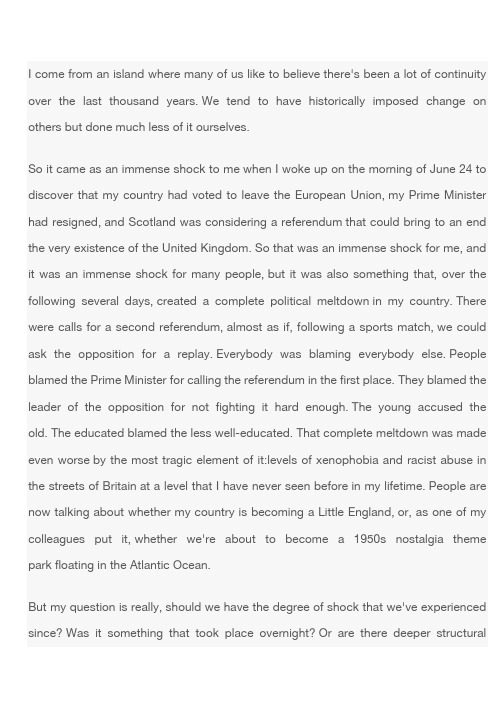
I come from an island where many of us like to believe there's been a lot of continuity over the last thousand years. We tend to have historically imposed change on others but done much less of it ourselves.So it came as an immense shock to me when I woke up on the morning of June 24 to discover that my country had voted to leave the European Union, my Prime Minister had resigned, and Scotland was considering a referendum that could bring to an end the very existence of the United Kingdom. So that was an immense shock for me, and it was an immense shock for many people, but it was also something that, over the following several days, created a complete political meltdown in my country. There were calls for a second referendum, almost as if, following a sports match, we could ask the opposition for a replay. Everybody was blaming everybody else. People blamed the Prime Minister for calling the referendum in the first place. They blamed the leader of the opposition for not fighting it hard enough. The young accused the old. The educated blamed the less well-educated. That complete meltdown was made even worse by the most tragic element of it:levels of xenophobia and racist abuse in the streets of Britain at a level that I have never seen before in my lifetime. People are now talking about whether my country is becoming a Little England, or, as one of my colleagues put it, whether we're about to become a 1950s nostalgia theme park floating in the Atlantic Ocean.But my question is really, should we have the degree of shock that we've experienced since? Was it something that took place overnight? Or are there deeper structuralfactors that have led us to where we are today? So I want to take a step back and ask two very basic questions. First, what does Brexit represent, not just for my country, but for all of us around the world? And second, what can we do about it? How should we all respond?So first, what does Brexit represent? Hindsight is a wonderful thing. Brexit teaches us many things about our society and about societies around the world. It highlights in ways that we seem embarrassingly unaware of how divided our societies are. The vote split along lines of age, education, class and geography. Young people didn't turn out to vote in great numbers, but those that did wanted to remain. Older people really wanted to leave the European Union. Geographically, it was London and Scotland that most strongly committedto being part of the European Union, while in other parts of the country there was very strong ambivalence. Those divisions are things we really need to recognize and take seriously. But more profoundly, the vote teaches us something about the nature of politics today. Contemporary politics is no longer just about right and left. It's no longer just about tax and spend. It's about globalization. The fault line of contemporary politics is between those that embrace globalization and those that fear globalization.If we look at why those who wanted to leave -- we call them "Leavers," as opposed to "Remainers" -- we see two factors in the opinion polls that really mattered. The first was immigration, and the second sovereignty, and these represent a desire for people to take back control of their own lives and the feeling that they are unrepresented bypoliticians.But those ideas are ones that signify fear and alienation. They represent a retreat back towards nationalism and borders in ways that many of us would reject. What I want to suggest is the picture is more complicated than that, that liberal internationalists, like myself, and I firmly include myself in that picture, need to write ourselves back into the picture in order to understand how we've got to where we are today. When we look at the voting patterns across the United Kingdom, we can visibly see the divisions. The blue areas show Remain and the red areas Leave. When I looked at this, what personally struck me was the very little time in my life I've actually spent in many of the red areas. I suddenly realized that, looking at the top 50 areas in the UK that have the strongest Leave vote, I've spent a combined total of four days of my life in those areas. In some of those places, I didn't even know the names of the voting districts. It was a real shock to me, and it suggested that people like me who think of ourselves as inclusive, open and tolerant,perhaps don't know our own countries and societies nearly as well as we like to believe.And the challenge that comes from that is we need to find a new way to narrate globalization to those people, to recognize that for those people who have not necessarily been to university, who haven't necessarily grown up with the Internet, that don't get opportunities to travel, they may be unpersuaded by the narrative that we find persuasive in our often liberal bubbles.It means that we need to reach out more broadly and understand. In the Leave vote, a minority have peddled the politics of fear and hatred, creating lies and mistrust around,for instance, the idea that the vote on Europe could reduce the number of refugees and asylum-seekers coming to Europe, when the vote on leaving had nothing to do with immigration from outside the European Union. But for a significant majority of the Leave voters the concern was disillusionment with the political establishment. This was a protest vote for many, a sense that nobody represented them, that they couldn't find a political party that spoke for them, and so they rejected that political establishment.This replicates around Europe and much of the liberal democratic world. We see it with the rise in popularity of Donald Trump in the United States, with the growing nationalism of Viktor Orbán in Hungary, with the increase in popularity of Marine Le Pen in France. The specter of Brexit is in all of our societies.So the question I think we need to ask is my second question, which is how should we collectively respond? For all of us who care about creating liberal, open, tolerant societies,we urgently need a new vision, a vision of a more tolerant, inclusive globalization, one that brings people with us rather than leaving them behind.That vision of globalization is one that has to start by a recognition of the positive benefits of globalization. The consensus amongst economists is that free trade, the movement of capital, the movement of people across borders benefit everyone on aggregate. The consensus amongst international relations scholars is that globalization brings interdependence, which brings cooperation and peace. But globalization also has redistributive effects. It creates winners and losers. To take the example ofmigration, we know that immigration is a net positive for the economy as a whole under almost all circumstances. But we also have to be very aware that there are redistributive consequences, that importantly, low-skilled immigration can lead to a reduction in wages for the most impoverished in our societies and also put pressure on house prices. That doesn't detract from the fact that it's positive, but it means more people have to share in those benefits and recognize them.In 2002, the former Secretary-General of the United Nations, Kofi Annan, gave a speech at Yale University, and that speech was on the topic of inclusive globalization. That was the speech in which he coined that term. And he said, and I paraphrase, "The glass house of globalization has to be open to all if it is to remain secure. Bigotry and ignorance are the ugly face of exclusionary and antagonistic globalization."That idea of inclusive globalization was briefly revived in 2008 in a conference on progressive governance involving many of the leaders of European countries. But amid austerity and the financial crisis of 2008, the concept disappeared almost without a trace.Globalization has been taken to support a neoliberal agenda. It's perceived to be part of an elite agenda rather than something that benefits all. And it needs to be reclaimed on a far more inclusive basis than it is today.So the question is, how can we achieve that goal? How can we balance on the one hand addressing fear and alienation while on the other hand refusing vehemently togive in to xenophobia and nationalism? That is the question for all of us. And I think, as a social scientist, that social science offers some places to start. Our transformation has to be about both ideas and about material change, and I want to give you four ideas as a starting point.The first relates to the idea of civic education. What stands out from Brexit is the gap between public perception and empirical reality. It's been suggested that we've moved to a postfactual society, where evidence and truth no longer matter, and lies have equal status to the clarity of evidence. So how can we --How can we rebuild respect for truth and evidence into our liberal democracies? It has to begin with education, but it has to start with the recognition that there are huge gaps.In 2014, the pollster Ipsos MORI published a survey on attitudes to immigration, and it showed that as numbers of immigrants increase, so public concern with immigration also increases, although it obviously didn't unpack causality, because this could equally be to do not so much with numbers but the political and media narrative around it. But the same survey also revealed huge public misinformation and misunderstanding about the nature of immigration. For example, in these attitudes in the United Kingdom, the public believed that levels of asylum were a greater proportion of immigration than they were, but they also believed the levels of educational migration were far lower as a proportion of overall migration than theyactually are. So we have to address this misinformation, the gap between perception and reality on key aspects of globalization. And that can't just be something that's left to our schools, although that's important to begin at an early age. It has to be about lifelong civic participation and public engagement that we all encourage as societies.The second thing that I think is an opportunity is the idea to encourage more interaction across diverse communities.One of the things that stands out for me very strikingly, looking at immigration attitudes in the United Kingdom, is that ironically, the regions of my country that are the most tolerant of immigrants have the highest numbers of immigrants. So for instance, London and the Southeast have the highest numbers of immigrants, and they are also by far the most tolerant areas. It's those areas of the country that have the lowest levels of immigration that actually are the most exclusionary and intolerant towards migrants.So we need to encourage exchange programs. We need to ensure that older generations who maybe can't travel get access to the Internet. We need to encourage, even on a local and national level, more movement, more participation, more interaction with people who we don't know and whose views we might not necessarily agree with.The third thing that I think is crucial, though, and this is really fundamental, is we have to ensure that everybody shares in the benefits of globalization. This illustration fromthe Financial Times post-Brexit is really striking. It shows tragically that those people who voted to leave the European Union were those who actually benefited the most materiallyfrom trade with the European Union. But the problem is that those people in those areasdidn't perceive themselves to be beneficiaries. They didn't believe that they were actually getting access to material benefits of increased trade and increased mobility around the world.I work on questions predominantly to do with refugees, and one of the ideas I spent a lot of my time preaching, mainly to developing countries around the world, is that in order to encourage the integration of refugees, we can't just benefit the refugee populations, we also have to address the concerns of the host communities in local areas. But in looking at that, one of the policy prescriptions is that we have to provide disproportionately better education facilities, health facilities, access to social services in those regions of high immigration to address the concerns of those local populations. But while we encourage that around the developing world, we don't take those lessons home and incorporate them in our own societies.Furthermore, if we're going to really take seriously the need to ensure people share in the economic benefits, our businesses and corporations need a model of globalization that recognizes that they, too, have to take people with them.The fourth and final idea I want to put forward is an idea that we need more responsible politics. There's very little social science evidence that compares attitudes onglobalization.But from the surveys that do exist, what we can see is there's huge variation across different countries and time periods in those countries for attitudes and tolerance of questions like migration and mobility on the one hand and free trade on the other. But one hypothesis that I think emerges from a cursory look at that data is the idea that polarized societies are far less tolerant of globalization. It's the societies like Sweden in the past, like Canada today, where there is a centrist politics, where right and left work together, that we encourage supportive attitudes towards globalization. And what we see around the world today is a tragic polarization, a failure to have dialogue between the extremes in politics,and a gap in terms of that liberal center ground that can encourage communication and a shared understanding. We might not achieve that today, but at the very least we have to call upon our politicians and our media to drop a language of fear and be far more tolerant of one another.These ideas are very tentative, and that's in part because this needs to be an inclusive and shared project.For those of us who believe that our identities are not mutually exclusive, we have to all work together to ensure that globalization takes everyone with us and doesn't leave people behind. Only then will we truly reconcile democracy and globalization.。
英国为什么要脱离欧盟_原因有哪些

英国为什么要脱离欧盟_原因有哪些英国宣布脱离欧盟!!很多人都感到疑惑,英国为什么要脱离欧盟?那么下面小编就为大家带来英国脱离欧盟的原因吧。
关于英国打算离开欧盟的消息最近的火热程度快赶上地球另一边的叙利亚战争了。
其实自打2010年英国首相戴维·卡梅伦上台以来,他就不止一次嚷嚷过英国要退出欧盟;而在他2015年连任后,再次提到之前就制定的关于2017年举行全民公投退出欧盟的时间表,与此同时就在我们这边过年的时候英国给欧盟开出了几个条件,说如果无法满足,那么这个退欧公投将会提前到今年6月份举行;结果欧盟对这几个条件的答复还算让卡梅伦满意,于是他又开始逢人便说我觉得吧,其实留在欧盟还是挺好的。
所以大家都不难得出一个简单明了的结论,那就是英国退欧事件本质上是一起绑架案,而退出欧盟就是谈判破裂的撕票,绑架者英国开出的条件就是胁迫欧盟对自己这个成员国进行特殊对待,从而满足自己的大资产阶级利益要求。
那么问题来了,英国为何要干这一票绑架案?关于英国这个国家想必没有人觉得陌生。
当年全球第一个完成工业革命的国家,当第三世界人民还在刀耕火种时,人家已经把蒸汽机装上轮船开始全世界占领殖民地了,占领后殖民地的土特产一船一船地拉回家卖钱搞建设。
一战二战之后英国相比以前有所衰落,数量庞大的殖民地就渐渐罩不住了,殖民地这才纷纷独立英国这只八爪鱼的触角逐渐缩回了老家,但是不能忽略的是此时的英国已经超额完成了原始积累。
虽然如今的英国比起别的发达国家似乎没有什么特别的过人之处,但是不能否认英国在工业、金融、教育、体制、福利等各方面都非常完善和高级,曾经的辉煌过去与现在的高品质让英国人产生了一种傲娇心态。
如何理解这种傲娇心态呢,好比80年代土豪开着夏利你只能蹬自行车,三十年过去了你开奥迪土豪也开奥迪,但是土豪和你的心态是不一样的,你还需要自拍露出方向盘发朋友圈来炫耀,而土豪内心深处对这种行为是很不屑的,内心深处也是不愿意跟你相提并论的。
英国脱欧的英语作文

英国脱欧的英语作文Title: The Impact of Brexit: A Comprehensive Analysis。
Brexit, the withdrawal of the United Kingdom from the European Union, marks a significant turning point in both British and European history. Since the referendum in 2016, the process has been tumultuous, with numerous debates, negotiations, and uncertainties. In this essay, we will delve into the multifaceted impact of Brexit on various aspects, including the economy, politics, society, and international relations.Firstly, let's explore the economic ramifications of Brexit. The decision to leave the EU has undoubtedly introduced a high degree of uncertainty, affecting investment, trade, and economic growth. The depreciation of the pound sterling following the referendum has led to increased import costs, inflationary pressures, and a decline in real wages for many workers. Moreover, the disruption to supply chains and the introduction of non-tariff barriers have added further challenges to businesses, particularly those reliant on frictionless trade with EU member states. While some argue that Brexit couldeventually lead to new trade opportunities with non-EU countries, the immediate consequences have been characterized by economic uncertainty and volatility.In addition to the economic dimension, Brexit has also had profound political implications. The decision to leave the EU has exposed deep divisions within British societyand triggered debates over national identity, sovereignty, and the role of government. The negotiations between the UK and the EU have highlighted the complexities ofdisentangling from a decades-long relationship, with disagreements over key issues such as trade, fisheries, and the Irish border. Furthermore, Brexit has reignited debates over the future of the United Kingdom itself, with Scotland expressing renewed interest in independence and concerns over the status of Northern Ireland.Furthermore, Brexit has had a significant impact on society, particularly regarding immigration andmulticulturalism. One of the central promises of the Leave campaign was to regain control over immigration policy and reduce net migration to the UK. However, the implicationsof stricter immigration controls have raised concerns about labor shortages in key sectors such as healthcare, agriculture, and hospitality. Moreover, Brexit has led to increased uncertainty and anxiety among EU citizens livingin the UK and British citizens living in EU member states, with questions over residency rights, access to healthcare, and the recognition of professional qualifications.Lastly, Brexit has reshaped the United Kingdom's international relations and its role on the global stage. The decision to leave the EU has necessitated the renegotiation of trade agreements with countries around the world, as the UK seeks to establish itself as an independent trading nation. However, the process of forging new trade deals has proven to be complex and time-consuming, with disagreements over regulatory standards, market access, and tariff schedules. Moreover, Brexit has raised questions about the UK's influence within international organizations such as NATO, the United Nations, and the World TradeOrganization, as it seeks to redefine its foreign policy priorities outside of the EU.In conclusion, Brexit represents a seismic shift in the political, economic, and social landscape of the United Kingdom and Europe as a whole. While the full consequencesof Brexit are yet to be fully realized, it is clear thatthe decision to leave the EU will have far-reaching implications for generations to come. As the UK navigates the complexities of its new relationship with the EU andthe rest of the world, it is imperative to address the challenges and opportunities that lie ahead with pragmatism, resilience, and cooperation.。
英国脱欧作文英文
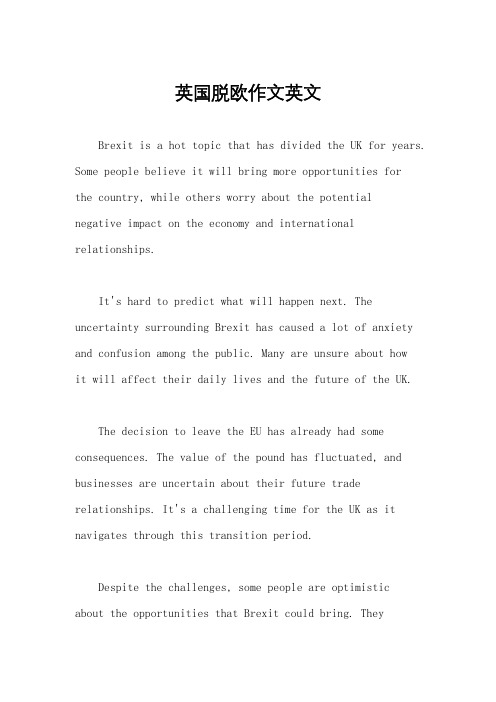
英国脱欧作文英文Brexit is a hot topic that has divided the UK for years. Some people believe it will bring more opportunities forthe country, while others worry about the potentialnegative impact on the economy and international relationships.It's hard to predict what will happen next. The uncertainty surrounding Brexit has caused a lot of anxiety and confusion among the public. Many are unsure about howit will affect their daily lives and the future of the UK.The decision to leave the EU has already had some consequences. The value of the pound has fluctuated, and businesses are uncertain about their future trade relationships. It's a challenging time for the UK as it navigates through this transition period.Despite the challenges, some people are optimisticabout the opportunities that Brexit could bring. Theybelieve that the UK will be able to negotiate better trade deals and have more control over its laws and regulations.On the other hand, there are concerns about the potential impact on immigration and the rights of UK citizens living in the EU. Many people are worried about the future of their jobs and the stability of the economy.Overall, Brexit has sparked a lot of debate and uncertainty. It's a complex issue with no clear answers, and the future of the UK is still uncertain as it continues to navigate through this historic transition.。
英国人为啥那么想脱欧

英国人为啥那么想脱欧6月23日,注定是英国人重要的日子,也是欧盟经受自世界金融危机和欧洲债务危机以来,另一次历史性的严峻考验。
英国公投的民意测验,似乎对脱欧(Brexit)派越来越靠近。
我虽然对英国脱欧与否没有明确态度,但是,我也很愿意了解民间对脱与不脱的各种说法。
有人认为英国脱欧,就像苏格兰想脱离英联邦一样,虽然有许多好处,但是,在全球化发展到了21世纪的今天,一个经济体量相对比较小的国家,如果脱离其长期有着紧密联系的经济与政治共同体,去谋求新的经贸、投资和政治合作伙伴,必将遭受意想不到的打击。
比如说,英国的对外贸易,有60%在欧洲共同体里面产生,这些贸易几乎都是零关税的。
除了对外贸易,投资和劳动力的流动,也都非常方便。
与中国人从广东跑到湖北一样,英国人也可以随便从英国跑到欧盟28个成员国的任何地方,可以定居,也可以工作,甚至享受当地政府的各种社会服务和福利。
欧盟是在1952年欧洲煤钢共同体6个成员国(德意法,荷比卢)的基础上逐步发展壮大起来的,并于1965年正式成立,总部设在比利时的首都布鲁塞尔。
在欧盟内部,设有欧洲中央银行,欧洲投资银行,欧洲农业共同政策等重要机构。
爱尔兰、英国和丹麦于1973年加入欧盟,是欧洲最早12个成员国之一。
在2004年之前,欧盟成员国都在欧洲西部,简称西欧。
2004年5月1日,有包括捷克、斯洛伐克、爱沙尼亚、匈牙利、波兰等10个东欧国家同时加入欧盟,使欧盟的成员国一下子从15个变成25个,到2007年,又有3个东欧国家加入了欧盟,使欧盟的成员国增长到了28个,包括保加利亚和罗马尼亚这些人均收入比较低,经济发展比较落后的东欧国家。
在欧盟内部,有17个国家实行了货币同盟,这些国家放弃了本国货币,统一使用欧元。
欧元是1999年开始出现的,但是,到了2002年才在17国全面使用,使德国马克、法国法郎、意大利里拉等原来世界比较有名的硬通货,变成了历史。
16年前,关于英国是否要加入欧元,曾经展开了一场激烈的争论。
- 1、下载文档前请自行甄别文档内容的完整性,平台不提供额外的编辑、内容补充、找答案等附加服务。
- 2、"仅部分预览"的文档,不可在线预览部分如存在完整性等问题,可反馈申请退款(可完整预览的文档不适用该条件!)。
- 3、如文档侵犯您的权益,请联系客服反馈,我们会尽快为您处理(人工客服工作时间:9:00-18:30)。
N0.3
Mutual Suspicion Ferment Quickly
Quickly Ferment——Mutual Suspicion
Under the previous context,Britain's Conservative Party began to doubt the EU policy had a negative impact rather than positive,trends in some future's policy may also harm to the Britain.At same time,the spread of the European debt crisis had not only accelerated the spread of suspicion of Europe,but also speeded up the step of Brexit. In contrast, others of the EU had became increasingly dissatisfied with Britain's "unreliable",thinking Britain as a member of the EU, played a negative role in integrating into the EU (for it not only opposed Euro, did not participate in the meeting, not address the crisis in EU, but also opposed all financial regulatory policies). Trust between the two sides had slided to the lowest point right away.
IN OR
OUT
谢
By ZERO 2017/11/20
1973
1975
1984
Margaret Thatcher, the prime minister, succeeded in getting the European Community's agreement to refund the British budget contribution partly. British Prime Minister Blair planned to join the euro of the European single currency after 1997, and was stopped by Gordon Brown, the chancellor of the exchequer.
The suspicion of Europe
Splendid Isolation
Finally all of these contribute to "Brexit referendum" today.
etc...... Benefits Conflicts Immigration issues
BREXIT
1997
Rough road to the EU--Britain's
1960
1973
1975
1984
1997
President De Gaulle
Harold Wilson
Prime Minister Heath Edward
Tony Blair
M2
Benefits Conflicts
Britain's rough road to the EU
1960
Applied to join the European Union's economic community, but rejected by French President De Gaulle. Prime Minister Heath restarted negotiations and eventually became a member of EU. Prime Minister Wilson held a referendum to decided Britain's remaining in the European community.
Cameron also wanted to negotiate with the European Union about Brexit as bargaining chips to get more benefits from the EU.
The outbreak of the European debt crisis
N0.4
Political votes force referendum
Political votes force referendum
It was reported that the support of Britain's Conservative Party fell continually. Prime Minister Cameron's "Brexit referendum" speech may helped to regain part of the votes for the independent party that supported Brexit.
Splendid Isolation Benefits Conflicts
For historical and geographical reasons, since the late 19th century, Britain had carried out a policy of non-intervention in European. Not in eurozone as Britain was,issuing its own independent currency, maintaining its export competitiveness, and having its own fiscal policy was easy.But which made it difficult to join in affairs'handling in European.Especially in European debt crisis,due to the obvious divergence of benefits, Britain was gradually losing its status and participation in the EU.
BREXIT
Do you know how Brexit happened?
So what happened? What caused Brexit?
Historical Background? Do you support Brexit?
N0.1
Rough road to the EU—Britain's
